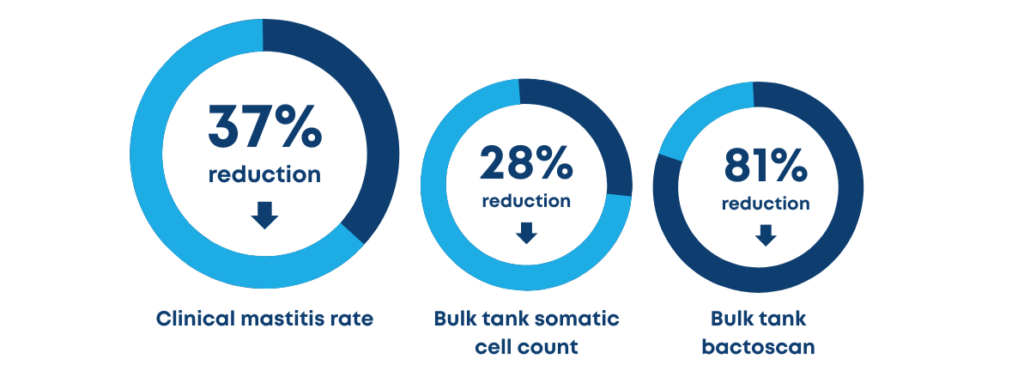ClO2 water treatment may be a simple tool in the reduction of mastitis
Tackling the water hygiene issues at one dairy site has delivered many benefits, including a reduction in mastitis, that fell by 37% year-on-year. The payback period for the investment was under 2.5 years, with a £6,000-£7,000/year increase in profits thereafter, based on clinical mastitis reduction alone, not including the saving in mains water costs or other health benefits.
Background
The catalyst for this farm to address its water hygiene was a contaminated borehole. Mains water was being used as an alternative – this was costing the farmer a significant amount of money, and they were keen to get back to using borehole water. The farm was milking around 260 Holstein over a year, and using approximately 38,000 litres per day.
Why is water important for mastitis?
Water is a risk factor for mastitis, udder health and milk hygiene due to;
- Bacterial pathogens in incoming water supplies
- Biofilm and pathogen build up in the farm water infrastructure
- Contamination of water supply
Water testing confirmed the borehole water was highly contaminated with bacteria, including a high TVC (Total Viable Count) and coliforms. This water contained major mastitis pathogens. The bacteria can spread to the udder in a number of ways; splashing around water troughs, but potentially more importantly, water use in the parlour during milking or in plant washing. Installing FarmWater resolves this by killing any pathogens in the incoming water feed to the farm. It also meant that there was clean water all the way through the water infrastructure on site, including all pipes, tanks and troughs.

Reducing disease, improving performance and financial rewards
Whilst the FarmWater system was installed to allow the borehole to be utilised, Ruminant Lead Phil Elkins was keen to analyse what other benefits could be attributed to the water cleanliness. “I looked at other factors around the farm from the information available a year before the FarmWater installation, and a year after, to see how certain health parameters might have been influenced, and in particular, mastitis.”
The results
Aside from the installation of FarmWater, there were no other changes on the farm. The ‘headline results’ were as follows:

Improved payment threshold performance for bulk tank bactoscan
Although the 81% reduction is important, what was particularly relevant to the farmer was the drop in the number of times that they went over the payment threshold of 50 for bulk tank bactoscan pre FarmWater. In the year before installation, they were over the threshold 24% of the time – losing a significant amount of money. Post installation, this has gone down to 7%, or a reduction of 71%.

With a case of mastitis costing between £350 and £400, the reduction in clinical cases of mastitis alone would save this farm between £9,000 and £10,000. This will cover the cost of the FarmWater equipment and running costs quickly, and make the farmer a considerable return on investment going forwards.
Phil concludes “Putting this all together, we can see that FarmWater can have a positive influence on a number of factors including disease, performance and financial rewards. As we get more data from the dairy farms with FarmWater, and as more sites come on board, I’m confident we’ll see even more concrete benefits that we’ll be able to link back to improved water quality.”
If you’d like to find out more about our water hygiene solution and how it can benefit your farm, get in touch – solutions@farmwater.co.uk

